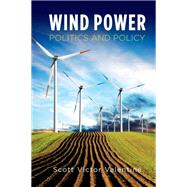Wind Power Politics and Policy
, by Valentine, Scott Victor- ISBN: 9780199862726 | 0199862729
- Cover: Hardcover
- Copyright: 11/27/2014
The wind power development policy community faces a conundrum. On the one hand, as the most commercially viable form of utility-scale renewable energy, the wind power industry has experienced in excess of ten-fold growth in total installed capacity over the past decade. On the other hand, installed wind power capacity still accounts for less than 2% of global electricity-generation capacity, despite the prevalence of studies indicating that, in certain situations, wind power can be a cheaper form of electricity than most fossil fuel alternatives. Accordingly, the most puzzling aspect of wind power development policy can be summed up in the following manner: given the global imperative to facilitate an expedient transition away from CO2-intensive energy technologies and the commercial viability of wind power, what is stopping the wind power industry from capturing higher market shares around the world?
In Wind Power Politics and Policy, Scott Valentine examines this question from two angles. First, it presents an analysis of social, technical, economic and political (STEP) barriers which research shows tends to stymie wind power development. Case studies which examine phlegmatic wind power development in Japan, Taiwan, Australia and Canada are presented in order to demonstrate to the reader how these barriers manifest themselves in practice. Second, the book presents an analysis of STEP catalysts which have been linked to successful growth of wind power capacity in select nations. Four more case studies that examine the successful development of wind power in Denmark, Germany, the USA and China are put forth as practical examples of how supportive factors conflate to produce conditions that are conducive to growth of wind power markets. By examining its impediments and catalysts, the book will provide policymakers with insight into the types of factors that must be effectively managed in order to maximize wind power development.
In Wind Power Politics and Policy, Scott Valentine examines this question from two angles. First, it presents an analysis of social, technical, economic and political (STEP) barriers which research shows tends to stymie wind power development. Case studies which examine phlegmatic wind power development in Japan, Taiwan, Australia and Canada are presented in order to demonstrate to the reader how these barriers manifest themselves in practice. Second, the book presents an analysis of STEP catalysts which have been linked to successful growth of wind power capacity in select nations. Four more case studies that examine the successful development of wind power in Denmark, Germany, the USA and China are put forth as practical examples of how supportive factors conflate to produce conditions that are conducive to growth of wind power markets. By examining its impediments and catalysts, the book will provide policymakers with insight into the types of factors that must be effectively managed in order to maximize wind power development.






